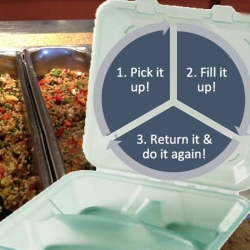Campus Sustainability News
News on campus sustainability initiatives, emerging programs, rankings, awards, student initiatives, green teams, and more from across the Cornell University campus.

Concerned about high energy bills, drafty rooms, or your carbon footprint? Interested in renewable energy sources? Join energy educators from Cornell Cooperative Extension and HeatSmart Tompkins in this three-part home energy resource series. Learn about steps you can take to save money and reduce household greenhouse gas emissions.

Global warming reduction may someday get a cool new tool: climate engineering. The SilverLining Safe Climate Research Initiative has awarded a $500,000 grant to a Cornell engineering researcher, who will model the effects of introducing reflective aerosols into the stratosphere, which could deflect enough sunbeams to reduce Earth’s temperature and limit climate change impact.

Before you leave campus for a much-deserved winter break, please join your colleagues in “powering down” your offices, labs, and common areas –your hard-working electronics need a vacation too!

Each year, millions of disposable paper and styrofoam containers end up in landfills after just one use. As part of Cornell Dining's Sustainability Action Plan, we're taking steps to reduce the use of single-use disposable containers, especially as takeout meals have become a vital part of staying safe this year.

The conference featured three days of problem-solving workshops, such as finding ways to engage students with the United Nations’ Sustainable Development Goals.

An important tactic for slowing climate change is for private companies to reduce their greenhouse gas emissions, but knowing exactly how much they’re emitting can be a challenge. To address this need, researchers in the College of Agriculture and Life Sciences (CALS) have developed an online greenhouse gas (GHG) emissions accounting tool, FAST-GHG, to help quantify these emissions in crop production.

Soil holds about three times as much organic carbon as the atmosphere, which means that making strategic changes to how soil systems are used could play a major role in combating climate change. With that in mind, two Cornell soil scientists have helped develop a powerful new tool that will help researchers and policymakers map the global potential for carbon sequestration. Soils Revealed is an open-access, interactive platform that uses cutting-edge technology to model how soil organic carbon has fluctuated over the last 11,000 years and to project soil’s future carbon-storing capacity.

Sarah Brylinsky, who works in the Campus Sustainability Office, said she sees the current pandemic as a time where innovation for sustainability can thrive and make Cornell a model for other universities. “[I am] confident that Cornellians … are destined to help us create a future in which our choices as a society are overall better across each of sustainability’s areas of focus — including learning from the current global challenges to help inform a new future,” Brylinsky said.

When three of the region's higher education institutions discovered they shared a sudden need to find a new primary food distributor, Cornell University, Ithaca College, and SUNY Cortland realized they had an opportunity to gain some efficiencies while continuing to influence collegiate dining trends. All three schools prepared requests for proposals to food distributors that could operate in Central New York, and all three were able to compare notes on the candidates.

Organic field crop farmers in the Northeast and Upper Midwest are facing an increasing number of challenges related to more extreme weather events and pest and disease outbreaks. Now, a Cornell-led team of experts will support organic agriculture by developing more sustainable practices that balance the tradeoffs between productivity, environmental impact and growers’ quality of life. The project, “Taking Tillage Out Of Organic Grain Crop Production With Ecology, Tools, And Technology,” launched this fall, thanks to a four-year, $2 million grant from the USDA’s National Institute of Food and Agriculture, Organic Agriculture Research and Extension Initiative.
